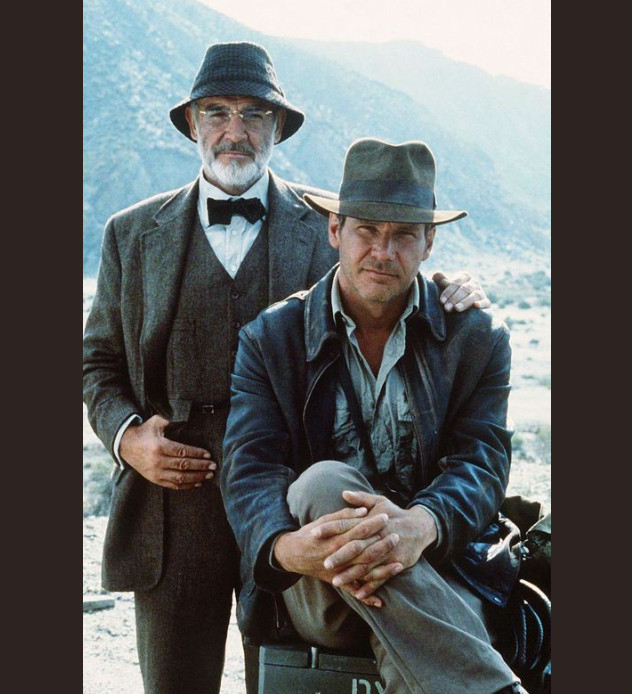Harrison Ford and Sean Connery are two of the most iconic actors of their generation. Both found immense fame and success in major film franchises early in their careers – Connery as James Bond and Ford as Han Solo in Star Wars. However, their stories diverged in important ways after those initial breakthrough roles. Connery made a conscious decision to leave Bond behind and pursue more varied projects, while Ford continued starring in blockbuster franchises. Looking back, Ford’s career trajectory mirrors some of the savvy choices Connery made that allowed him to thrive for decades as a bankable leading man. While Ford has never publicly discussed Connery as a direct influence, there are educated guesses that can be made about valuable lessons the younger actor may have learned from watching Connery’s example.
Breaking Out of a Typecast
One of Connery’s smartest moves was walking away from James Bond after You Only Live Twice in 1967, when the character was at the peak of his popularity. Connery had played Bond in six Eon Productions films over seven years and felt it was time for new creative challenges. He recognized the danger of being pigeonholed solely as 007, saying “I didn’t want to get identified with one thing only.” This decision allowed Connery the freedom to accept diverse roles that showcased his range, such as his Academy Award-winning performance as a tough Irish cop in The Untouchables.
Ford faced a similar risk of being forever branded as smug smuggler Han Solo after the massive success of the original Star Wars trilogy between 1977-1983. Like Connery, Ford made a conscious effort to break out of that box through projects like Witness, The Fugitive, and Patriot Games. These roles highlighted Ford’s acting talents beyond sci-fi action films and helped cement his status as a serious dramatic actor. Taking a page from Connery, Ford seemed to understand the importance of artistic growth and not letting any one role define his career. Both actors found continued success by proving their versatility.
Longevity and Staying Power
Connery enjoyed a renaissance in his career well after most leading men had faded, starring in hits throughout the 1980s and 1990s like The Name of the Rose, The Untouchables, Indiana Jones and the Last Crusade, and The Rock. This longevity showed his enduring popularity and ability to remain a top box office draw for decades. Ford may have seen Connery as a model for sustaining a career over the long haul rather than flaming out after an initial run of success.
Ford mirrored Connery’s staying power by continuing to take on major roles well into his 60s and 70s in franchises like the Indiana Jones films and Blade Runner 2049, as well as Oscar contenders like 42 and The Call of the Wild. Like Connery, Ford has proven his ability to transition gracefully from action hero roles to more mature dramatic parts. Both actors have navigated their later careers intelligently, choosing projects that maintain their star power while also pushing creative boundaries. Connery set an example of how to remain a compelling leading man well into one’s senior years that Ford seems to have learned from.
Choosing Roles Wisely
Connery turned down roles that didn’t excite or challenge him creatively, even when they represented big paychecks. He passed on playing Gandalf in The Lord of the Rings trilogy and the role of Captain Alex Ramsey in The Rock, saying the latter character wasn’t complex or interesting enough. This selectivity allowed Connery to focus on projects he was passionate about.
Ford similarly has a reputation for commitment to quality over quantity. He has walked away from roles he didn’t feel were the right fit, like Neo in The Matrix. Ford is also very hands-on in the development and production process for the films he does sign on for. Both actors seemed to understand that choosing roles wisely is key to an enduring career, rather than just chasing every lucrative offer. Their discerning attitudes toward the scripts and directors they worked with allowed Connery and Ford to avoid being defined by any single genre or type of character.
Aging Gracefully
Connery found rich characters to play in his later years that didn’t depend on his physical abilities, like a reclusive writer in Finding Forrester and a aging professor in Indiana Jones and the Last Crusade. These roles highlighted his gravitas, wisdom, and screen presence.
Ford has followed a similar path, taking on compelling parts that don’t require him to be an action hero. He brought nuance to roles like Branch Rickey in 42, the explorer John Thornton in The Call of the Wild, and detective Frank Hamer in In the Line of Fire. Like Connery, Ford has continued finding meaningful stories to tell as he’s aged instead of retiring from leading roles. Both actors set an example of how leading men can transition successfully into character and supporting parts later in their careers, retaining their star power while exploring new facets of performance.
Lessons Learned
While Ford has never directly cited Connery as an influence, it’s reasonable to believe the younger actor may have gleaned valuable career lessons just from observing Connery’s example up close as a fellow Hollywood icon. Connery’s intentional break from Bond and commitment to choosing roles carefully over many decades allowed him to sustain a long, varied career at the highest levels.
Ford seems to have internalized these lessons, from breaking typecasts and building a filmography of diverse parts to maintaining his star status into his later years through selective projects. Both actors understood the importance of constant reinvention and proving one’s versatility. Their careers show that with smart choices and hard work, it’s possible for leading men to enjoy decades of continued success in Hollywood rather than being a flash in the pan. While their paths weren’t identical, Connery undoubtedly blazed a trail that Ford’s career mirrors in its longevity, resilience and refusal to be confined to any single role or genre. Both remain examples of graceful aging and sustained excellence in their chosen field.



